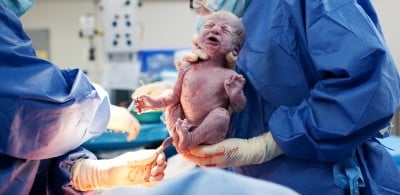A little more than two months ago, several UK hospitals banned all non-cesarean births to help cut national health care costs. This movement was recently counteracted by the National Institute for Health and Clinical Excellence (NICE); a sect of the UK National Healthcare System (NHS).
The NHS ban on cesarean births affected all non-emergency cesareans (selective cesarean). The overall goal was to cut national health care costs and to provide more benefits to both mother and baby. Numerous studies have indicated that natural births provide health benefits to baby, pose less risk to mom and have a shorter healing period than cesarean births. In respect to cost, the ban could have saved the NHS an insurmountable amount of money. Being only two months into the ban, there is no way to tell for certain if these benefits would have been realized through the ban or not.
As you might guess, the removal of the ban has stirred quite a controversy. The NICE recommendation automatically overrules the previous guidelines set by the NHS – guidelines that many people felt were best for everyone involved – mother, child, health care system, hospitals, doctors.
Professor at the Royal College of Midwives, Cathy Warwick, said that non-medical cesareans were “inappropriate.” Dr. Mark Porter, consultant obstetric anesthetist stated that placing obligation on the NHS to perform a cesarean birth on a woman that doesn’t need one is “potentially quite expensive and hugely controversial.” According to the UK Daily Mail, “The ruling is likely to trigger more debate about the use of NHS resources.”
Despite the objections, however, there are some very strong supporters for the NICE overthrow of the NHS ban. Dr. Bryan Beattie, an obstetrician that helped draft the guidelines said, “It is a huge development in terms of allowing women to make an informed choice. Ten or fifteen years ago, there may have been a better argument for saying no. But cesarean sections have become much safer. We have closed the gap to the extent that you really do have to bring in maternal choice as part of the decision-making process.”
The Royal College of Obstetricians and Gynecologists pointed out that around 12 percent of all attempted natural births will result in an emergency cesarean anyway. At the onset of the original ban, some critics pointed out that a complicated natural birth is more harmful than a cesarean and that, by giving women a choice, some emergency cesareans could be avoided.
The overturn is not expected to change the situation for all women, however. Women may be turned down for cesarean births based on cost in some areas. Additionally, it is also understood at this time that any physician that is uncomfortable with performing a cesarean in which there is no medical need must refer the mother to another surgeon that is willing to perform the procedure.
NICE was set up in 1999 and is designed to ensure that all residents in England and Wales have equal access to high-quality health care. This goal is accomplished through a variety of tasks, one of which is the submission of recommendations to the NHS. Sometimes the recommendations made by NICE go against new guidelines or cost-efficiency of the NHS, but the overall goal is to ensure that the National Healthcare System is providing the best level of care for all UK residents.
Related Articles:
- UK Hospitals Ban Cesarean Births to Cut Costs
- Researchers Find Vaginal Birth Success After Cesarean Based on Specific Factors
- Report: Cesarean Birth Rates Still on the Rise







